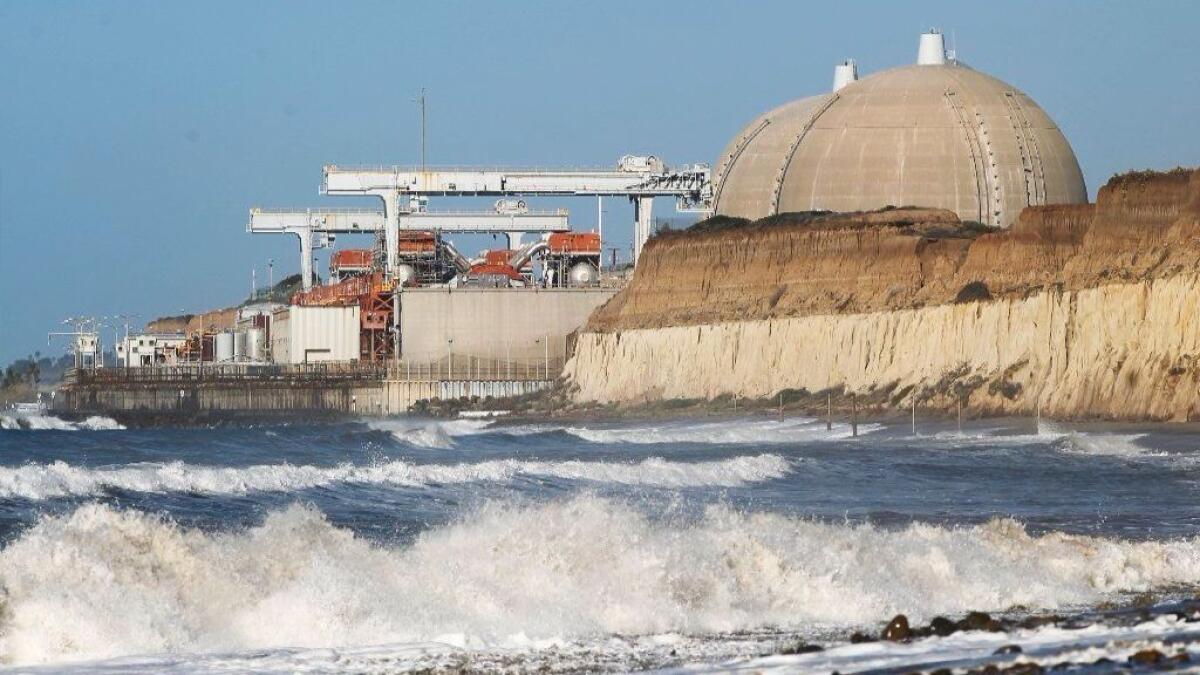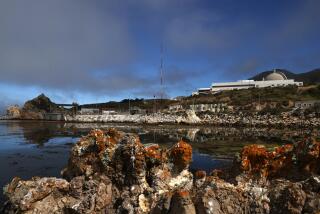Utility customers win $775 million back from San Onofre deal criticized as lopsided against them

Plant owners and consumer attorneys have struck a bargain in the long-running dispute over who pays for the failure of the San Onofre nuclear plant.
Southern California Edison and San Diego Gas & Electric agreed to shave $775 million from the multibillion-dollar pact that allowed them to charge millions of ratepayers for the plant in northern San Diego County, which shut down in January 2012 amid a radiation leak.
For 6.4 million customers across Southern California, the savings will total $121 on the average bill over four years.
The agreement was announced Tuesday after a settlement conference in San Francisco between utility and consumer attorneys. It would supersede a 2014 plan approved by regulators that imposed $3.3 billion of the estimated $4.7 billion in costs related to the San Onofre Nuclear Generating Station failure on customers, as opposed to utility shareholders.
State regulators must sign off on the settlement before it takes effect.
The primary negotiators — utility lawyers and the Aguirre & Severson law firm in San Diego — signaled their agreement to more favorable terms for customers three weeks ago, when they notified the commission they planned to schedule settlement talks in the long-running dispute.
The specific terms were not disclosed until the meeting concluded late Tuesday.
In short, Edison and SDG&E agreed to forsake any further collections related to the broken nuclear plant through February 2022, when the assessments were scheduled to stop under the original 2014 agreement. Edison agreed to reimburse SDG&E for $151 million that won’t be collected from customers.
“This is great news for ratepayers,” said attorney Maria Severson. “It was the courage of the federal-court plaintiffs and their willingness to go to court that made this happen.”
Edison owns almost 80% of the plant, and SDG&E is a minority owner.
“We are pleased to be able to bring closure to this issue,” Edison President Ron Nichols said in a statement. “The parties undertook extensive efforts over many months to reach agreement, and SCE looks forward to timely regulatory approval.”
Michael Aguirre, a former federal prosecutor and San Diego city attorney, sued the California Public Utilities Commission and Edison in 2014, claiming the initial deal amounted to an illegal taking of property. The argument was rejected in U.S. District Court but the U.S. 9th Circuit Court of Appeals took up the case.
The original agreement was approved by the utilities commission in November 2014, and revelations soon thereafter called its fairness into question — including reporting by the San Diego Union-Tribune on an undisclosed meeting in Poland in 2013 that shaped the terms. Edison disclosed the meeting days after the Union-Tribune report and was fined $16.7 million for related violations.
“Making a deal in a Warsaw hotel is among the most absurd and unlawful conduct that’s been disclosed in years,” said Aguirre, who filed multiple lawsuits and dozens of demands for public records in his quest to overturn the 2014 settlement.
Aguirre & Severson will collect attorney fees of just over $5.4 million — the first time the firm will receive compensation for its litigation challenging the San Onofre costs.
Other consumer advocates hailed the agreement as a historic win for ratepayers.
“It is a boatload of disgorgement,” said attorney John Geesman of the nonprofit Alliance for Nuclear Responsibility, using the legal term for the act of giving up illegal profits. “It represents a pragmatic compromise on both sides.”
Notes from the March 2013 meeting in Poland spelled out a series of deal points, most of which made their way into the settlement that was approved unanimously in November 2014.
One of the terms negotiated between regulators and an Edison executive at the Hotel Bristol Warsaw — $25 million from the utilities to pay for greenhouse gas research at the University of California — was disavowed in the latest agreement.
Instead, the two utilities will contribute a total of $12.5 million to support climate-change research conducted at Cal State campuses. Edison shareholders will donate $2 million a year over the next five years and SDG&E will give $500,000.
Parties to the settlement also agreed not to besmirch the utilities or assign any liability to the plant owners in public discussions.
Charles Langley of the group Public Watchdogs, not a party to the settlement, criticized the new deal for being struck much the same way as the old one — out of the public’s view.
“The failure of San Onofre was caused by Southern California Edison’s failure to deploy equipment that was approved by the [Nuclear Regulatory Commission],” Langley said. “This failure was 100% the fault of Edison, and it is an abortion of justice to ask ratepayers to pay anything.”
The San Onofre nuclear plant was a mainstay in the regional power supply for decades, generating some 2,200 megawatts of electricity.
Six years ago, the facility was closed after newly installed replacement steam generators wore thin and leaked radiation. The $680-million upgrade was supposed to add up to 40 years to the life of the plant.
Edison has always blamed the plant’s failure on Mitsubishi Heavy Industries, maker of replacement steam generators. Edison was awarded $125 million in an arbitration case with the manufacturer.
“SCE is focused on safely decommissioning the nuclear plant, guided by core principles of safety, stewardship and engagement,” the company said in a statement Tuesday.
UPDATES:
Jan. 31, noon: This article was edited and tightened throughout.
This article was originally published Jan. 30 at 8 p.m.
More to Read
Inside the business of entertainment
The Wide Shot brings you news, analysis and insights on everything from streaming wars to production — and what it all means for the future.
You may occasionally receive promotional content from the Los Angeles Times.











